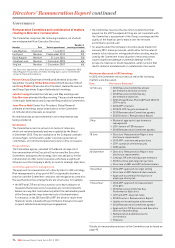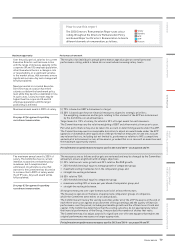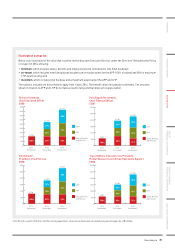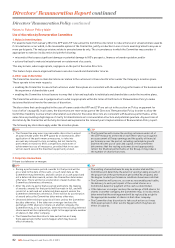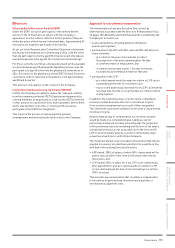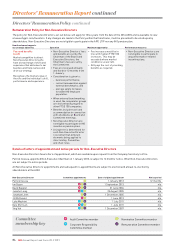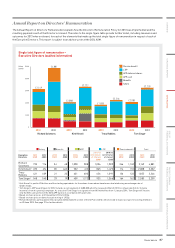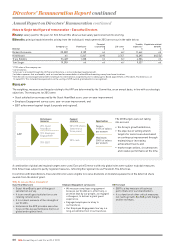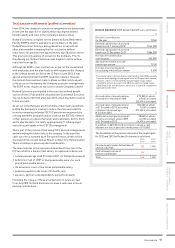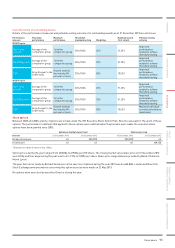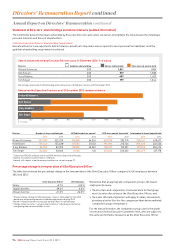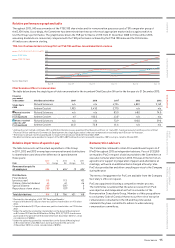Holiday Inn 2013 Annual Report Download - page 87
Download and view the complete annual report
Please find page 87 of the 2013 Holiday Inn annual report below. You can navigate through the pages in the report by either clicking on the pages listed below, or by using the keyword search tool below to find specific information within the annual report.
Consideration of shareholder views
The Committee actively engages with shareholders on remuneration
matters. Following face-to-face discussions with a number of
shareholders in the autumn of 2012, major shareholders were
approached prior to the 2013 AGM and offered the opportunity to
discuss any aspect of our approach to remuneration.A programme
of interactions with shareholders willcontinue in 2014.
Consideration of employment conditions elsewhere in
the Group
The Committee takes into consideration the pay and conditions
of employees throughout the Group when determining remuneration
for its Executive Directors. The Committee would increase an
Executive Director’s salary in line with the general UK and US
workforce other than when there is a change in role or
responsibility, or a significant variance to the market arises,
warranting a larger increase.
Newly promoted or recruited Executive Directors to the Board
may, on occasion, have their salaries set below the benchmark
policy level while they become established in role. In such cases,
salary increases may be higher than the general UK and US
workforce until the target positioning is achieved.
Group employees’ salaries are compared to cross-industry
standards to ensure fair pay for that job. The Company does
not directly consult with employees as part of the process of
determining Directors’ remuneration. However, questions on the
performance of Executive Committee members, including the
Executive Directors, are included in the Company’s annual
Employee Engagement surveys. While formal comparison
measurements were not used in determining Executive Director
remuneration, the Committee made decisions in the knowledge
of incentive arrangements of the rest of the Group, upon which
the Committee is briefed regularly.
Remuneration policy for other employees
The Company’s policy on the remuneration of Executive Directors
is consistent with that of other senior employees. This group of
approximately 48 people also participates and receives deferred
share awards under the APP. Eligibility to participate in the LTIP
extends to a wider set of around 258 employees in total.
Outside the senior employees’ group, the composition of
remuneration differs and annual incentives relate to measures
relevant to the individual’s role. Plans for corporate employees
are typically based on a combination of individual performance
and the Group’s earnings before interest and tax (EBIT).
Market-competitive specialist plans apply in certain areas
such as corporate reservations, sales and hotel development.
Incentive plans for General Managers of IHG owned, leased
and managed hotels commonly include targets based on gross
operating profit, guest satisfaction and employeeengagement.
Eligibility for, and participation in, benefits and incentive plans
differs depending on location, seniority, length of service and
otherfactors.
Service contracts and notice periods for
Executive Directors
The Committee’s policy is for all Executive Directors to have rolling
service contracts with a notice period of 12 months. All new
appointments will have 12-month notice periods, unless, on an
exceptional basis to complete an external recruitment successfully,
a longer initial notice period reducing to 12 months is used.
This is in accordance with the UK Corporate Governance Code.
All Executive Directors’ appointments and subsequent
re-appointments are subject to election and annual re-election
by shareholders at the AGM.
Details of current Executive Directors’ contracts
Executive Director Date of original appointment1Notice period
Richard Solomons 10 February 2003 12 months
Kirk Kinsell 1 August 2010 12 months
Tracy Robbins 9 August 2011 12 months
Paul Edgecliffe-Johnson 1 January 2014 12 months
1
The capital reorganisation of the Group, effective on 27 June 2005, entailedthe
insertion of a new parent company of the Group. All Executive Directors serving
at that time signed new letters of appointment effective from that date. The
dates shown above represent the original dates of appointment ofeach of the
Executive Directors to the Group’s parent company.
Non-executive directorships of other companies
The Company recognises that its Executive Directors may be
invited to become Non-Executive Directors of other companies
and that such duties can broaden experience and knowledge,
and benefit the Company.
Therefore, Executive Directors are permitted to accept one
non-executive appointment (in addition to any positions where
the Director is appointed as the Group’s representative), subject
to Board approval, as long as this is not, in the reasonable opinion
of the Board, likely to lead to a conflict of interest. Executive
Directors would generally be authorised to retain the associated
fees received.
Current Executive Directors do not hold any non-executive
directorships of any other company.
Governance 85
OVERVIEW STRATEGIC REPORT GOVERNANCE
GROUP
FINANCIAL STATEMENTS
PARENT COMPANY
FINANCIAL STATEMENTS ADDITIONAL INFORMATION



